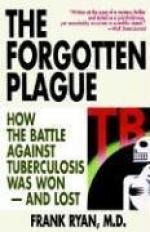|
This section contains 661 words (approx. 3 pages at 300 words per page) |

|
A chronic, infectious disease primarily attacking the lungs.
Tuberculosis (TB) is an chronic, infectious disease caused by Mycobacterium tuberculosis that primarily attacks the lungs. The tubercle bacillus is transmitted by droplets when an infected person coughs or sneezes. It is not spread through kissing or other physical contact. Children nearly always contract the disease from an infected adult.
The TB-infected areas of the lungs become dry and cheese-like, eventually hardening into scar tissue. The severity of the attack depends on whether the bacteria spreads from the lungs to other parts of the body. Tuberculin infection in the blood, the meninges (membranes around the brain and spinal cord), or the kidneys are the most serious. Children between the ages of six and 24 months are the most susceptible to meningitis; it is the chief cause of tuberculin death among children.
In 1987, there were one to two cases of tuberculosis for...
|
This section contains 661 words (approx. 3 pages at 300 words per page) |

|


